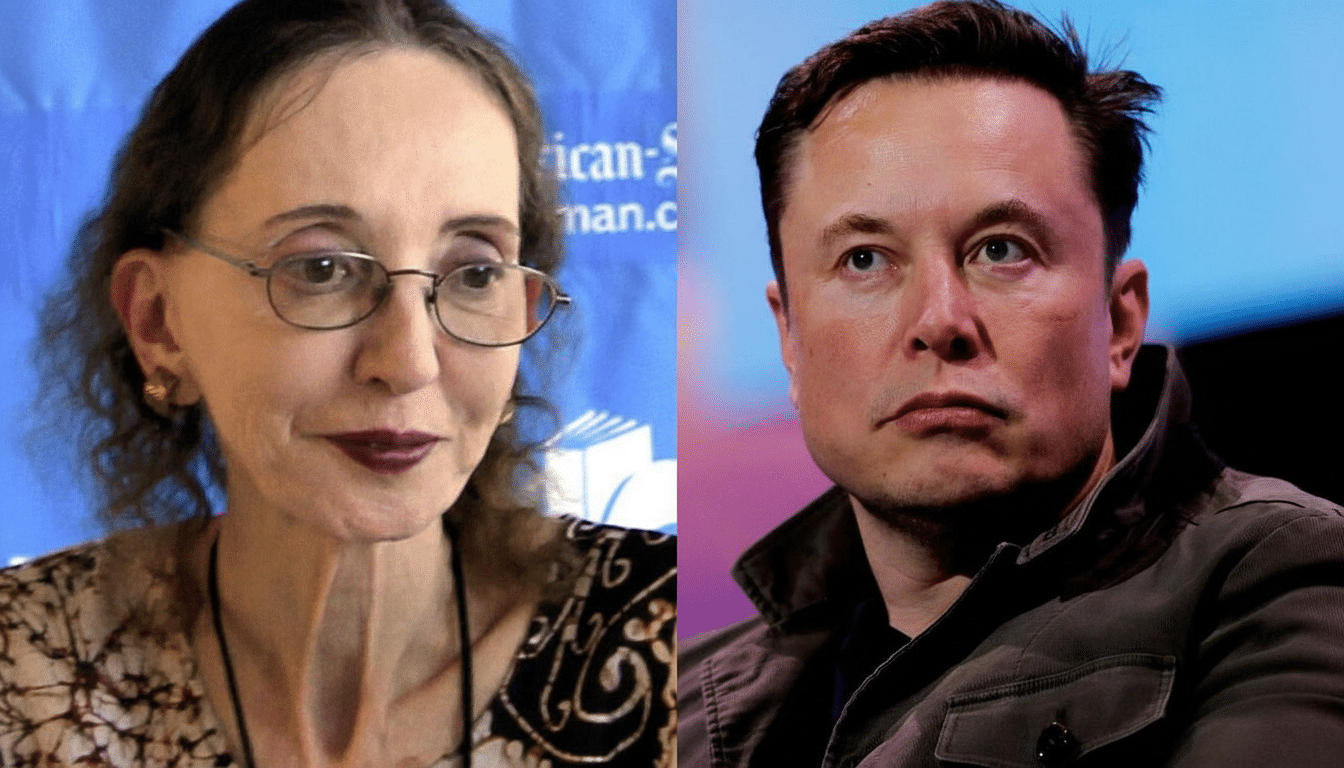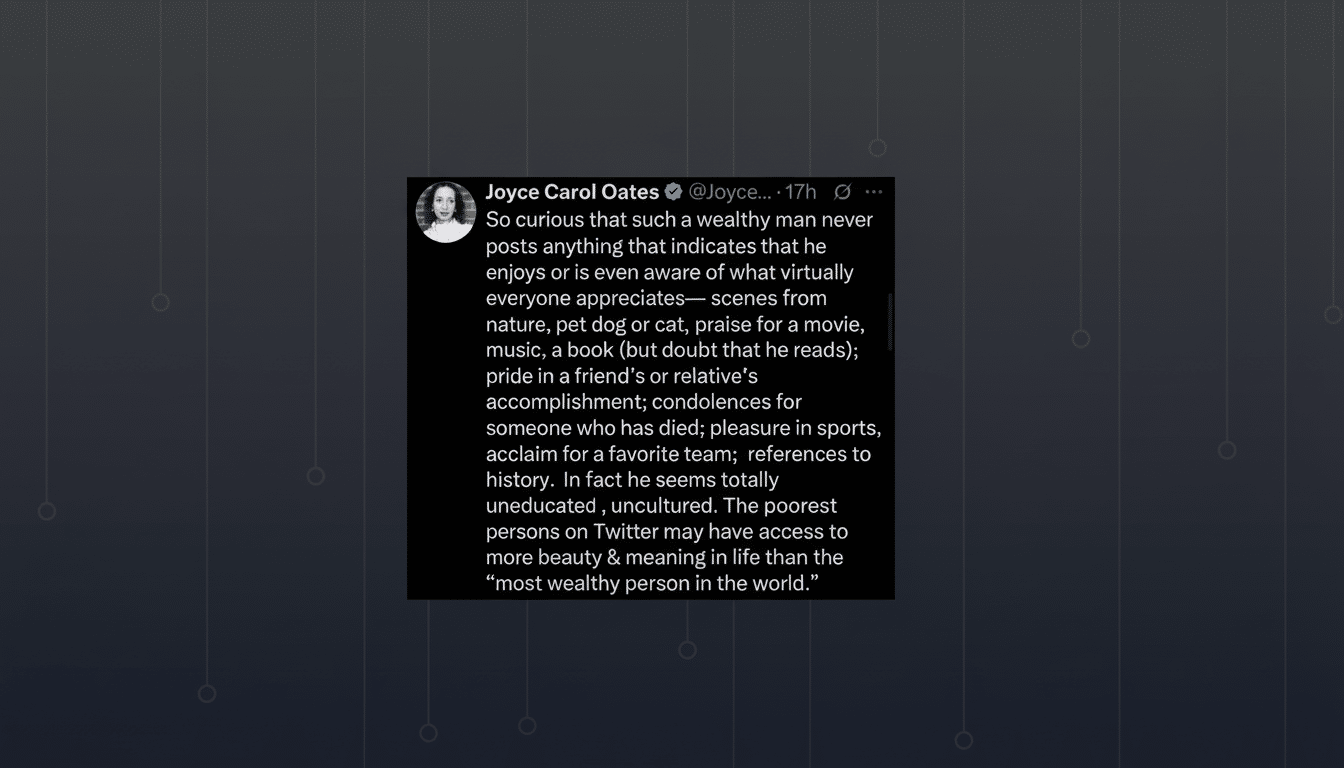Joyce Carol Oates, the National Book Award-winning author and notoriously unfiltered poster, unleashed a withering assessment of Elon Musk’s online persona on X. The critique went viral within hours; the platform owner fired back, sparking another wave of memes and broader talk about how influential people control their digital selves.
What Sparked the Spat Between Joyce Carol Oates and Musk
Oates popped up in Musk’s feed with a tweet essentially asking what on earth, “if anything,” he actually likes besides money and fighting. Her message wasn’t simply a cheap dunk; it was a literary critique of tone and content. She noted the lack of small, human moments that make up most ordinary timelines — shares about books, music, puppies, sports and condolences — and she wondered whether a life so visible but so spare might miss out on the point of being online altogether.

The observation landed partly because Oates is so enormous a presence in American letters and partly because, despite her avowed Luddism, she is human enough to be an inveterate user of the internet. Her videos racked up millions of views, but she’s spent years establishing her own idiosyncratic presence in a clutch of genres (literature, culture) and sometimes, to the alarm of followers worried about oversharing (like this magazine), overshares. If anyone is fit to read a public feed as a text, it’s Oates.
Musk Fires Back on His Platform with Combative Posts
Musk replied multiple times, rejecting Oates’s take as wrongheaded and peppering his response with personal put-downs of her, slung in part at her writing. The tone was in keeping with his well-known online mode: blunt, combative and calibrated to rev up his fans. Then, in something that smelled like damage control via posting, he started leaping into culture-thread replies—the quick-hit “good movie” responses almost totally absent of enthusiasm or any actual sense of interest.
It’s not that Musk has never had taste. His love for science fiction was widely reported — The New Yorker’s profile of him named one of his favorite books as “The Lord of the Rings” — and he has sporadically cited individual films or musicians. But such moments are few, in comparison with the great muddle of his feed: announcements and product releases; political grudges and conspiracy theories; meme skirmishes and algorithm-gaming provocations.
Why Oates’s Read on Musk’s Online Persona Resonated
Oates’s critique struck a nerve because it revealed a gap between the levers of power Musk grasps and the style of his posts. A platform leader who sets rules, shapes distribution and is nearly always somehow pretending to be the story also seems, at least online, broadly uninterested in participating in the small pleasures that connect communities.
There’s also a structural piece. Only a tiny percentage of U.S. users create the vast majority of posts on X; its top 20 percent accounts for some 98% of all tweets by U.S. adults, according to the Pew Research Center. Pew has also found that many Americans who have tried the company’s platform have taken long breaks and a significant share say they are not sure whether or not they will stick around. In an attention economy that rewards high-output accounts more than the rest, the incentive is to provoke reaction, not to linger over taste.

That calculus has business consequences. Musk has previously said advertising revenue dropped around 50% following the ownership transition, a decrease that put brand safety and sentiment under greater consideration. Moments like this one, in which the site’s owner is cast as a laughingstock protagonist, fuel engagement but muddy the platform’s pitch to skeptical advertisers.
Memes Pile On as Rival Platforms Jump In to the Fray
The internet did its thing. Users on X and rival networks like Bluesky seized on jokes that Oates had gotten under Musk’s skin, with riffs about him scrambling to pull some old movie quotes and evidence he reads. It wasn’t just mockery, in other words; it was cultural critique via meme, the crowd seeing if a tech titan could be ruffled by an octogenarian novelist’s feed-check.
Oates, for her part, remained herself in her own contributions—literature, cats, stray observations—and reiterated that her curiosity was real: Why would someone with nearly limitless resources exhibit so little of the curiosity and joy that animate most feeds? It’s a writerly question about character and motive playing out on the world’s most public stage.
The Possibility for X Amid Questions About Authenticity
This dustup is more than just another celebrity beef. It’s a case study in how the performance of personhood online can build or destroy trust. When the owner of a platform appears to post primarily to prosecute grievances or bait detractors, even charitable attempts at taste can scan as defensive, not genuine. Oates’s post distilled that tension down to a few lines, and the response cycle was proof of its premise.
The meme surge may subside by week’s end, but the question Oates raised will not: What does it mean when the most prominent account on a platform seldom reflects the everyday sources of meaning that its user base holds in common? The answer still remains the same. While that answer stands, anticipate more viral readings from the crowd—and more counterprogramming from its object.

